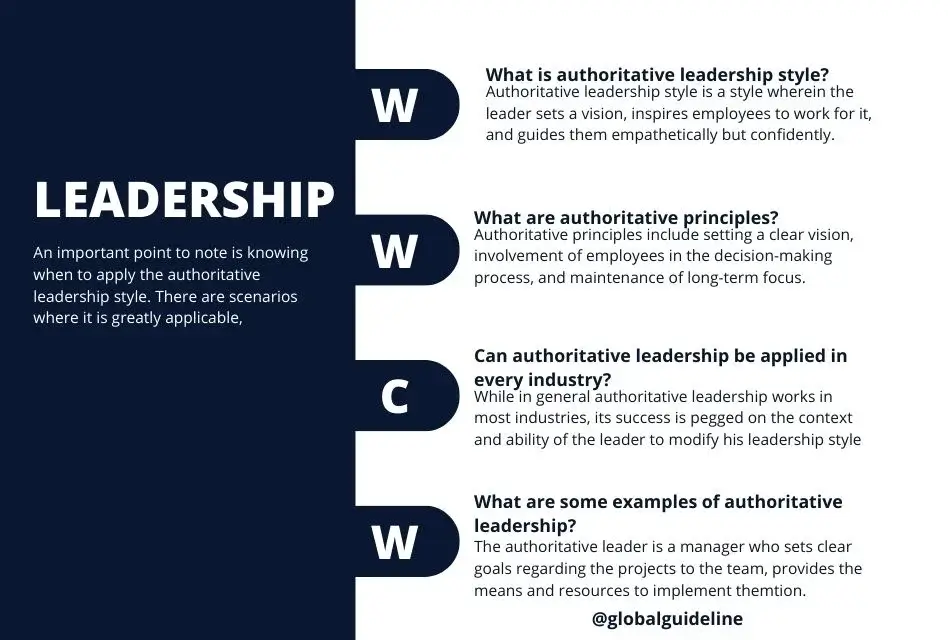Within the dynamic work environment characterizing today’s organizations, leadership styles play a huge role in deciding organizational success. Of the many types of leadership approaches, authoritative leadership stands apart with its inclination to instill a strong vision, stimulate creativity, and drive goals within an organization. This article covers the top 5 benefits of authoritative leadership in the USA, explaining how this leadership style will help gain success in a competitive landscape.
Table of Contents

What Does Authoritative Mean in Leadership?
The term “authoritative” is sometimes misused in leadership; therefore, it has to be defined. Such leaders provide a clear vision, inspire their members to work towards the completion of common objectives, and lead them with confidence, yet empathy. As opposed to the authoritarian management style, which is based on control of subordinates and requires obedience, authoritative leadership allows employees to innovate while keeping the vision of the organization in mind.
Authoritative Leadership Definition: A style of leadership in which the leader sets vision and direction, inspires and guides the team members toward that vision or goal, and fosters a working environment within which the employees feel motivated to contribute toward organizational goals.
Top 5 Benefits of Authoritative Leadership
Now that we have defined what authoritative leadership is, let us consider the top five ways this style will benefit the workplace.
1. Strong Vision and Direction:
Overview: The most outstanding advantage associated with authoritative leadership is that it brings clarity in vision and direction. One expects authoritative leaders to be able to project an appealing vision that comfortably fits their organization’s long-term goals and aspirations. This vision acts as a guide for employees, enables them to see their roles and responsibilities within the larger framework of the company’s objectives.
Why It Matters:
- Alignment: A strong vision ensures that all team members are working toward a common goal, reducing confusion and increasing productivity.
- Motivation: When employees understand the big picture, they are more motivated to contribute their best efforts.
- Consistency: Authoritative leaders maintain consistency in decision-making processes, ensuring that the organization stays on course.
Authoritative Leadership Examples: A CEO who clearly communicates the company’s future goals and continuously reminds the team of their collective mission is an example of authoritative leadership. This leader not only sets the direction but also inspires employees to take ownership of their tasks.
2. Encouragement of Creativity and Innovation
Overview: Contrary to popular belief, authoritative leadership does not stifle creativity. In fact, it encourages it by providing a safe space for innovation within the framework of the leader’s vision. Authoritative leaders understand that creativity is essential for problem-solving and staying competitive in the market.
Why It Matters:
- Innovation: Authoritative leaders, by giving incentives for creative thinking among members, instigate innovation that eventually produces new ideas and solutions.
- Empowerment: The workers will be empowered to experiment and try calculated risks since they know that the leader supports creative thinking.
- Adaptability: The organization led by an authoritative leader is better positioned to adapt itself to changes and new challenges in the market.
How to Be Authoritative: An authoritative leader is the one who has clear goals in sight yet gives people the autonomy to work out different routes through which these goals can be achieved. Only such a balance between direction and autonomy can create a culture of innovation.
3. High Level of Emotional Intelligence
Overview: Among the major characteristics of authoritative leadership is that the leader has a very high degree of emotional intelligence. It simply means that such leaders are sensitive to the emotions and needs of their team members, putting them in a better position to establish relations and maintain a positive working atmosphere.
Why It Matters:
- Trust: The level of emotional intelligence that authoritative leaders possess enables them to develop trust with the employees. This provides an atmosphere for better collaboration and working as a team.
- Conflict Resolution: Leaders high in emotional intelligence can manage conflicts better and resolve problems before they blow out of proportion.
- Employee Satisfaction: Only a leader who has the capacity to perceive and respond to the emotional needs of his people will be able to keep a high level of satisfaction and retention among employees.
What is the authoritative style of leadership? It is a style that puts vision together with empathy and emotional intelligence. This type of leadership style works under conditions when change is necessary, and team members are in dire need of guidance and motivation.
4. Improved Decision-Making Processes
Overview: Authoritative leaders exhibit a great ability to make highly informed, strategic decisions that help in achieving long-term organizational objectives. A great authoritative leader ensures that his team members are involved in the entire decision-making process to ensure that their perspectives are considered in making any key decision.
Why It Matters:
- Inclusiveness: Authoritative leaders include their team members in decision-making to ensure that decisions are rounded and take different perspectives into consideration.
- Efficiency: While authoritarian leaders appreciate contributions, they can be quite decisive, which means the decision-making process cannot take an unbearably long time.
- Accountability: The decisions are ones that they take ownership of, which builds trust and credibility for their team
Authoritative vs Authoritarian Leadership: While the authoritarian leader is one who makes decisions from the top with little to no input from his, authoritative leadership tries to strike a balance of decisiveness with inclusivity, hence ensuring the outcome is useful and sustainable.

5. Strong Emphasis On Long-Term Success
Overview: The authoritative leader looks at the long-term result in a big way as against short-term gain. The effectiveness of this style of leadership makes leaders interested in building a long-lasting future for the organization through strategic planning, employee development, and continuous improvements.
Why It Matters:
- Sustainability: Emphasis on long-term goals ensures competitiveness and resilience over time.
- Employee Development: An authoritative leader develops his or her subordinates so that, in the long run, they will not only benefit the organization but also help in building it definitely.
- Continuous Improvement: An authoritative leader aims for long-term success and, therefore, allows the organization to be constantly evolving and improving on its abilities.
Authoritative Leadership Traits: The key traits of authoritative leadership lie in having a clearly defined vision, emotional intelligence, decisiveness, and a commitment to the long-term. This makes such leaders inherently effective in guiding their organizations through moments of change and growth.
Authoritative Leadership at Work: Possible Interview Questions with Reflection
The purpose of this section is to provide you with probable interview questions on the authoritative leadership style. Before the actual job interview wherein authoritative leadership will be the topic, it is best to be equipped with the knowledge of its advantages and disadvantages, including how it is applied in the workplace.
Common Interview Questions:
- What is your definition of an authoritative leader?
- The question checks whether you know this style of leadership and its important features.
- Now, can you describe an instance when you applied authoritative leadership in the accomplishment of something?
- Here, he wants you to give specific examples that prove you are able to set a vision and direct a team in the execution of the same.
- How do you direct and allow creativity?
- The question seeks to determine your leadership with clarity of vision and creating space which allows for innovation.
- What are the advantages and disadvantages of authoritative leadership?
- Now, discussing the pros and cons shows you have nuanced understanding about when and how to use this leadership style to its full potential.
- How would you ensure your decisions are in the best interest of the organization in the long run?
- This question will check strategic thinking and commitment to the future success of the organization.
When to Use Authoritative Leadership Style
An important point to note is knowing when to apply the authoritative leadership style. There are scenarios where it is greatly applicable, including:
- During Organizational Change: In times of dramatic change within a company, an authoritative leader can provide the vision essential in such ambiguous moments.
- In Creative Industries: It sets vision in such industries that calls for innovation, but gives creative professionals space to think freely and, therefore, leads to innovation.
- Long-term projects: The authoritative leader is best suited for long-term projects that require sustained focus and consistent progress.
FAQs on Authoritative Leadership
1. What is authoritative leadership style?
Authoritative leadership style is a style wherein the leader sets a vision, inspires employees to work for it, and guides them empathetically but confidently.
2. How does authoritative leadership differ from authoritarian leadership?
Authoritative leadership involves guiding and inspiring the team members, whereas authoritarian leadership is related to controlling and making people obey without others’ opinions.
3. What are authoritative principles?
Authoritative principles include setting a clear vision, involvement of employees in the decision-making process, and maintenance of long-term focus.
4. Can authoritative leadership be applied in every industry?
While in general authoritative leadership works in most industries, its success is pegged on the context and ability of the leader to modify his leadership style to suit the organization’s needs.
5. What are some examples of authoritative leadership?
The authoritative leader is a manager who sets clear goals regarding the projects to the team, provides the means and resources to implement them, but also encourages innovation.

Conclusion
The benefits of authoritative leadership are numerous, especially within the dynamic and competitive USA work atmosphere. With a powerful vision, creativity, emotional intelligence, and better decision-making processes, leaders who exhibit an authoritative style can lead their organizations into long-term growth and success. This calls for a leader to know when and how to apply this style in order to maximize its potential for the benefit of both the leader and his or her team.
As you consider or prepare to take on a leadership role, consider these benefits and how you might best contribute authoritative leadership to bring your team and organization into the future. For those already leading or wanting to be leaders, much can be gained from taking on authoritative leadership that will make one a more successful leader in effectiveness, inspiration, and success.










